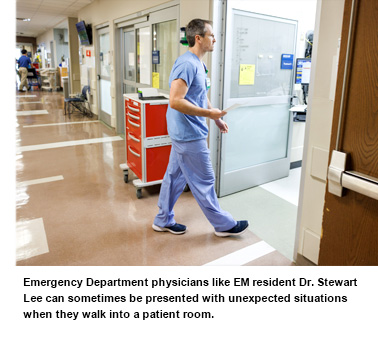Any Given Day
Good morning.
Currently, there is so much talk about the challenges in health care delivery. In Mississippi and across the country, rural access to needed services is declining as health care disparities are increasing. Through growing up in rural Mississippi, working over 20 years in our Emergency Department and now leading the state’s only academic medical center, I’ve had a ringside seat to the challenges we face.
I vividly recall one day years ago while working in the adult Emergency Department when back-to-back patients exemplified these differences so well. Here are their stories.
 It was an average Tuesday about 15 years ago in the ED. I was seeing patients as I always did then on Tuesday mornings while other faculty and residents attended the resident education conferences held at that time. On this average and seemingly insignificant day, a snapshot of all that is Mississippi presented itself.
It was an average Tuesday about 15 years ago in the ED. I was seeing patients as I always did then on Tuesday mornings while other faculty and residents attended the resident education conferences held at that time. On this average and seemingly insignificant day, a snapshot of all that is Mississippi presented itself.
I was in the “back,” which was the area of the ED where patients who are not acutely sick or injured are roomed. On the patient tracking board, I saw two patients in adjacent rooms with a chief complaint of “sore throat.” Some days are like that – multiple patients with a sore throat or nausea and vomiting or back pain, etc. It seemed today might be a sore throat day.
I stepped into the first room to see a young male patient who appeared healthy. This man, in his early 20s, attended a nearby college and woke up that day with a sore throat. He was covered by his parents’ insurance. He didn’t want to be sick or to get worse and he was worried about missing classes and getting behind in his coursework. He had already spoken to his concerned parents who were willing and able to support him in any way needed to be sure he was healthy and successful in school. I spent time counseling him along the same lines as I would counsel my own children with a sore throat – giving advice that was as much parenting as doctoring.
Diagnosis – minor sore throat. Prognosis – rapid return to excellent state of health.
Leaving his room, I slipped into the adjacent one to see the next patient with a sore throat. Every single detail was different. I would see in his chart that this gentleman was in his late 50s but looked much older. He was gaunt and appeared unhealthy. There was a mass on the left side of his neck about the size of a large orange and it had clearly been there a while. The surface was raw and oozing a blood-tinged fluid. My approach, my speed, my tone – they all changed in the blink of an eye. Every particle in my being slowed. After several initial questions for him, I followed with, “Have you seen anyone for this before now?” His answer, “No.” My next question, “Tell me why today is the day. Does it hurt more? Is it bleeding more? Are you having any trouble breathing or swallowing?” I wait. He says, “I just got a ride.”
Diagnosis – likely cancer, advanced stage. Prognosis – trying difficult treatments with poor chances of survival.
As I stepped outside the second patient’s room and braced myself for what would come next, I paused for a moment to soak it in. To memorize every detail of the last two encounters. Because in them, there was a portrait of well versus sick, rich versus poor, education versus lack of education. A portrait of Mississippi.
Two patients presenting to the same emergency room on the same day at the same time with the same chief complaint, but each representing the opposite ends of the health care spectrum. Each representing the dichotomy of life and means.
One young and healthy, positioned in life so that concerns for his health can take center focus when needed and supported by resources such as family, professors, insurance, transportation and money. One older and in poor health having lived a life where health could not be a priority. Lacking basic resources that made getting a ride to the doctor a major obstacle. His situation was void of the sophistication to navigate the complexities of the health care maze.
In some ways, what makes this story so important is that it is not actually special nor unique. Every physician across this state can tell similar stories of health system failures that result in heartrending endings.
If anyone can help address the health disparities of our state, it’s the caregivers, health scientists and future health care workforce at Mississippi’s sole academic medical center. We have much work to do to get to A Healthier Mississippi.



